Shifting societal norms and legal reforms have contributed to declining divorce rates in the UK; however, many couples are still considering parting ways. To better understand how many are considering divorce, why, and what would change their minds, we leveraged AI-driven audience profiling to synthesise insights from opinions expressed online to a high statistical confidence level.
We focused our study on a sample size of 10,260 people in the UK over the course of a year (ending December 12, 2024), and this is what we found.
Index
- 80,057 Marriages ended in divorce in the UK in 2022
- Overall decline in number of divorces per year for the last 10 years
- In The last decade, 12.9 years was the longest number of years married before divorce
- Only 0.2% couples satisfied with the emotional support they receive from marriage
- Nearly 30% of married people consider divorce due to financial issues
- 41% feel anger and regret when thinking about their marriage and divorce
- 67% of couples tried therapy to solve their marital issues
- Nearly 25% of couples say divorce discussions are honest
- 87% of couples prioritise stable housing post-divorce
- Children’s wellbeing preventing 43.5% of couples divorcing
- Communication an essential concern for 38.4% divorcing couples
- 83.7% say improved intimacy would make them rethink divorce
- 52.7% couples believe divorce would lead to better co-parenting
- 56.2% of couples considering divorce have children
- 67.4% of over 45s are considering divorce
- Women nearly 50% more likely to consider divorce than men
- About the data
80,057 Marriages Ended in Divorce in the UK in 2022
Divorce rates have reached a 50-year low, which is surprising for many. In 2022, England and Wales recorded 80,057 divorces, which is a 29.5% decrease from 2021 and the lowest number since 1971.
This decline is influenced by several societal changes, including the rise of cohabitation before marriage, which allows couples to assess their compatibility, potentially leading to more stable unions.
The drop in marriage rates is a contributing factor to the decline in divorce rates, too. In 2021, 46.9% of individuals in England and Wales were married, which was a drop from 49.4% in 2011. Predictions based on this trend reveal that by 2062, just one couple for every 400 adults in the UK will get married, compared to one couple for every 100 adults today. Plus, many individuals are delaying marriage until later in life, which often results in more mature relationships.
Legal reforms, such as the introduction of no-fault divorce laws in 2022, have also streamlined the process and reduced the number of separations. These shifts indicate that while fewer marriages are ending in divorce, the institution of marriage is evolving to align with more contemporary relationship patterns.
Overall Decline In Number Of Divorces Per Year For The Last 10 Years
Over the past decade, the United Kingdom has experienced fluctuations in the number of divorces. In 2012, there were 118,140 divorces, which slightly increased to 130,473 in 2013. The numbers then showed a general decline, with 101,127 divorces in 2018 and 119,428 in 2019.
In 2020, the figure was 112,182. A notable increase occurred in 2021, with 113,505 divorces, a 9.6% rise from 2020. However, 2022 saw a significant drop to 80,057 divorces, which is the lowest number since 1971.
In The Last Decade, 12.9 Years Was The Longest Number Of Years Married Before Divorce
Over the past decade in England and Wales, the median duration of marriages ending in divorce has generally increased. In 2022, the median duration for opposite-sex couples was 12.9 years, which is the longest on record. For same-sex couples, the median durations were 7.5 years for males and 6.3 years for females.
This trend suggests that couples now stay married longer before divorcing and correlates with our findings that older couples tend to consider divorce more than those younger.
How Satisfied Are You With The Following Aspects Of Your Marriage?
Only 0.2% couples satisfied with the emotional support they receive from marriage
Our audience sentiments express what aspects they are satisfied with in their marriage currently, and the graph below reveals the results:
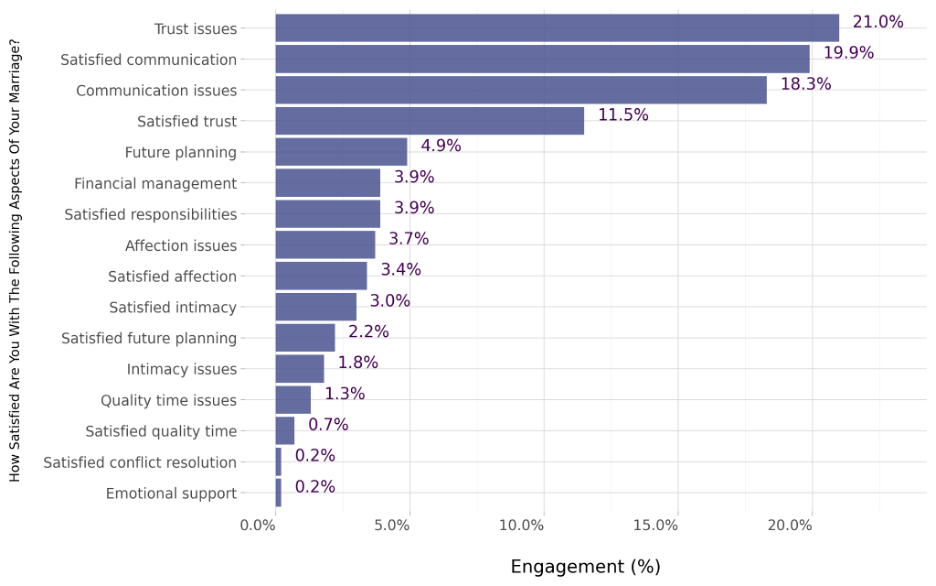
Prior to no-fault divorce, unreasonable behaviour was the most common reason for divorce. When looking at our audience responses to what they are satisfied with in their marriages, behaviour per se doesn’t feature, but it could be attributed to the number of couples who cite related issues as barriers to satisfaction.
21% have trust issues, 18.3% communication, and 3.7% affection. In contrast, 11.5% are satisfied with their level of trust, 19.9% with communication, and 3.4% with affection. Despite a lack of intimacy cited as a major reason for considering divorce, those satisfied with their intimacy levels are higher (3%) than those not satisfied (1.8%), while those satisfied with quality time (0.7%) are below those who have issues in this regard (1.3%).
Just 2.2% were satisfied with future planning compared to the 4.9% who had issues in this regard, only 4.9% were satisfied with the level of financial planning, and 3.9% were satisfied with responsibilities. Right at the bottom were the 0.2% who were satisfied with conflict resolution, tying with emotional support.
The findings reveal a disparity in marital satisfaction, with trust, communication, and affection garnering moderate satisfaction, while issues like future planning, financial planning, conflict resolution, and emotional support highlight areas of concern.
What Factors Have Contributed To Your Consideration Of Divorce?
Nearly 30% of married people consider divorce due to financial issues
Financial problems can cause major strain on a marriage, and our graph below reveals these and other factors that contribute to divorce considerations.
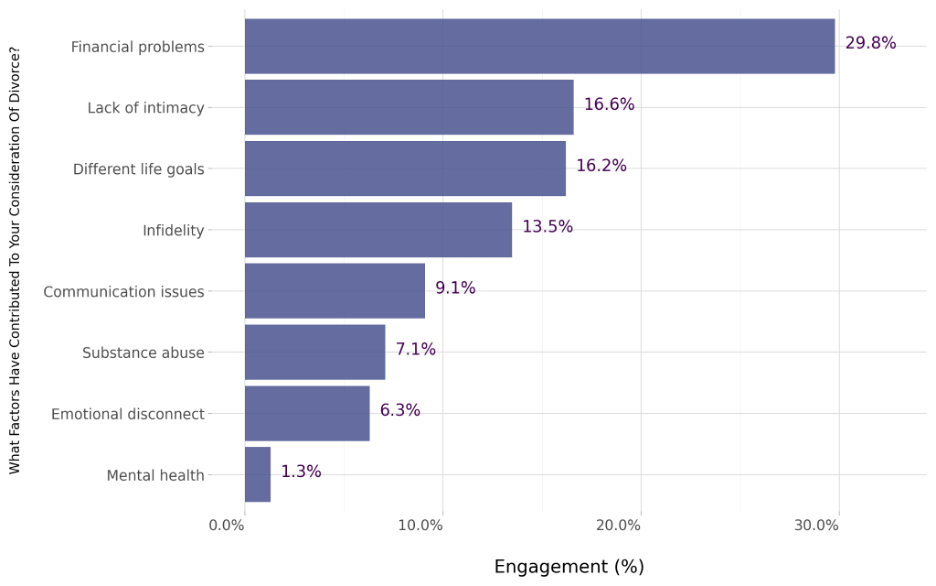
Despite Financial Conduct Authority findings that personal financial standing has improved slightly overall, a whopping 7.4 million people are still struggling to pay bills and make credit repayments. Considering the stress this can bring, it’s unsurprising that of our profiled audience, the highest number (29.8%) cite financial problems as a factor that contributes to their considering divorce. A lack of intimacy and different life goals are also major contributors, with engagement levels of 16.6% and 16.2%, respectively.
Thereafter, communication issues garner 9.1%, which is interesting as not only is communication the key to a healthy relationship, but it could also go a long way toward mitigating most of the factors on the list. Substance abuse is also a factor for 7.1% of our audience, as is emotional disconnect at 6.3%. Mental health garnered just 1.3%, which is interesting when you consider the rise in mental health issues occurring across the UK.
What Emotions Do You Most Often Experience When Thinking About Your Marriage And The Possibility Of Divorce?
41% feel anger and regret when thinking about their marriage and divorce
Anger and regret are common emotions when marriages near their end. Our graph delves deeper into what our audience feels about their marriages:
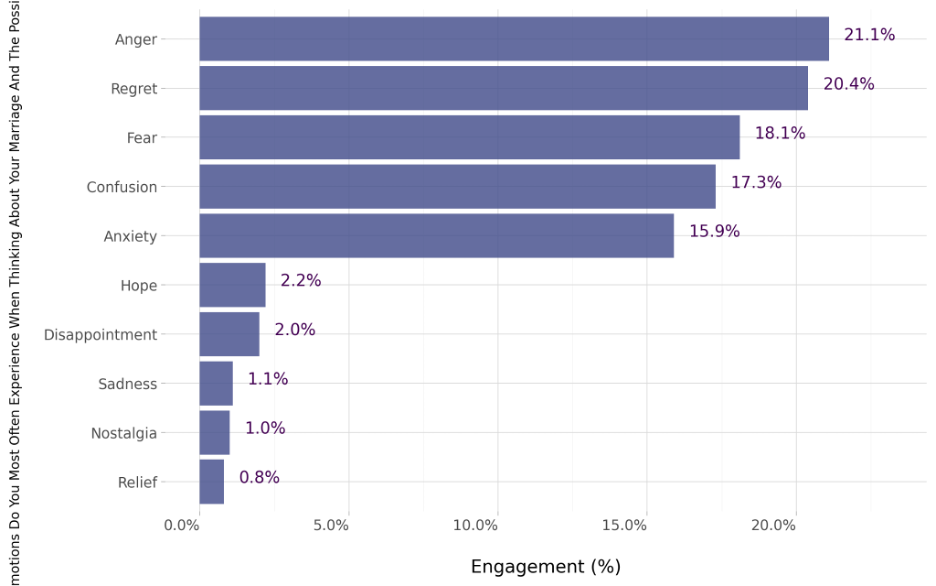
With 21.1% and 20.4% of our audience feeling anger and regret over their marriage and the possibility of divorce, it’s clear that these emotions are all too common. However, fear (18.1%), confusion (17.3%), and anxiety (15.9%) are also common emotions at this time.
One of the reasons for these intense emotions may be the fact that a vast number of people who want to get divorced simply cannot due to the cost of living crisis. In 2024 alone, this has led to the postponement of 19% of divorces involving 270,000 couples.
With far lower engagement levels were less intense emotions, with hope (2.2%), disappointment (2%), sadness (1.1%), nostalgia (1%), and relief (0.8%) all under 2.5%.
Have You Sought Professional Help To Address Marital Issues?
67% of couples tried therapy to solve their marital issues
Couples therapy proves to be the most common option for couples looking for professional help. Our graph reveals all the avenues our audience explored:
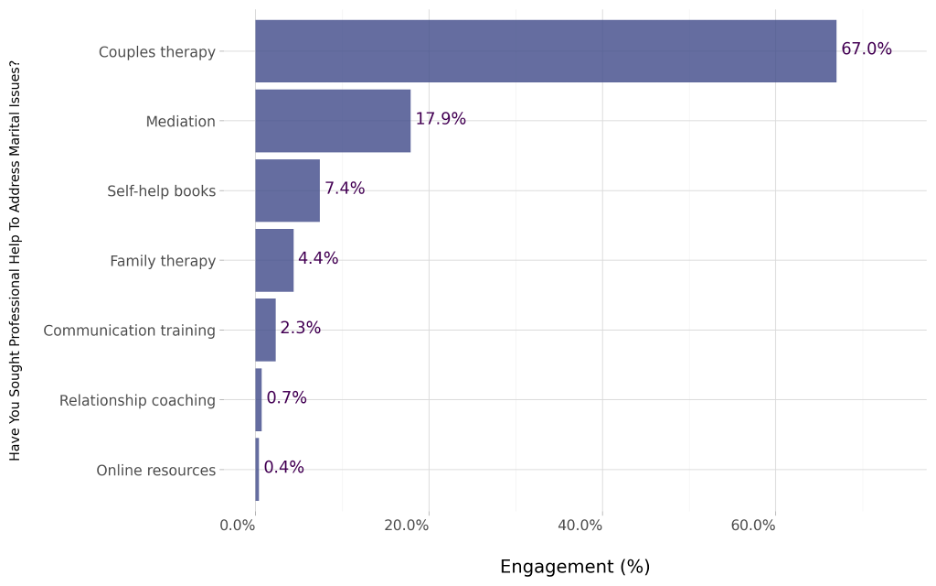
Nearly a third of therapists have noticed a rise in the number of enquiries for couples counselling in the UK in recent years. This aligns with the large number of couples (67%) we recorded as having tried couples therapy to save their marriages. Mediation proved moderately popular, with 17.9% of couples, while self-help books garnered 7.4% engagement levels.
Despite the increase in couples therapy, this didn’t seem to extend to family therapy, as only 4.4% had tried it, just 2.3% had undergone communication training, and even fewer (0.7%) had undergone relationship coaching. Online resources (which would potentially include virtual therapy sessions) barely registered, at just 0.4%, proving they were not a method couples relied on.
How Would You Describe Discussions Re Divorce With Your Spouse?
Nearly 25% of couples say divorce discussions are honest
Despite communication being a stumbling block for many, the highest number of couples say their discussion about divorce is honest; here’s what the data tells us:
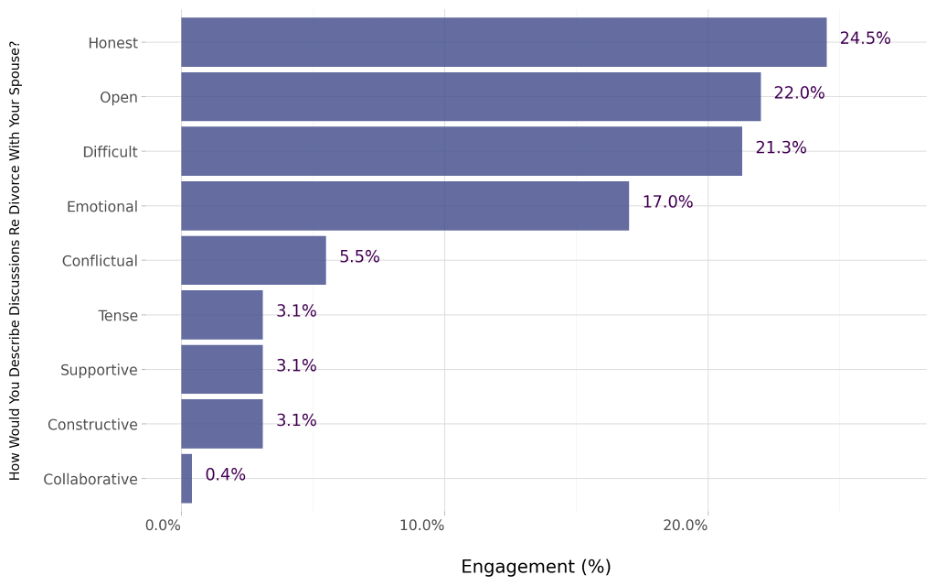
With The Divorce, Dissolution and Separation Act 2022 introducing no-fault divorce in the UK, discussions around the topic will no longer be centred on who is to blame. This may well contribute to the fact that 24.5% of couples who say that their discussions about divorce are honest, and 22% who say theirs are open. It is also possibly why conflictual (5.5%) and tense (3.1%) discussions are so limited.
17% of couples admit that their discussions are emotional, which is natural. What's positive is that 3.1% say theirs are supportive and constructive, with 0.4% even saying theirs are collaborative. With no-fault divorce in place, this could pave the way for fewer acrimonious splits in the future.
If You Decide To Divorce, What Are Your Primary Goals For Post-Divorce Life?
87% of couples prioritise stable housing post-divorce
Stable housing is clearly the number one objective for the majority of couples, with effective parenting tailing behind. We unpacked these statistics:
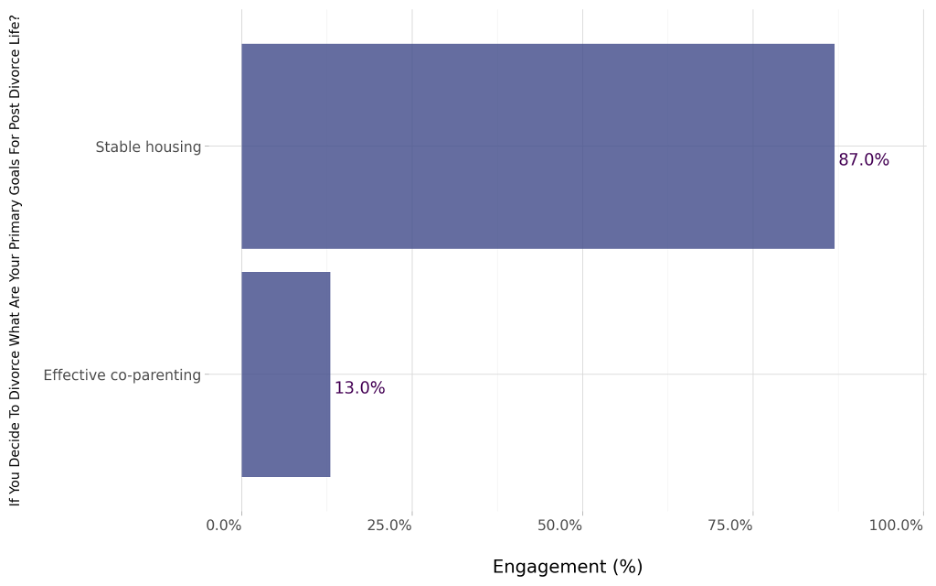
With rising rents, high property prices, and slow new-build rates, the UK is experiencing a housing affordability crisis, with many couples splitting up who cannot afford to move out of their shared homes. With this in mind and the fact that financial problems are the leading factor for considering divorce, it’s understandable why an overwhelming majority of 87% of couples are making stable housing their primary objective post-divorce.
Effective co-parenting was the other primary goal. However, it only garnered 13% engagement. Considering there are 3.8 million children in separated families in Great Britain, this level is relatively low, highlighting just how much of a problem the housing crisis poses for divorcees.
What Factors Are Preventing You From Making A Final Decision About Divorce?
Children’s wellbeing preventing 43.5% of couples divorcing
From the wellbeing of children to social support, there are numerous factors that are stopping couples from filing for divorce. We took a closer look at what the data in the graph below reveals:
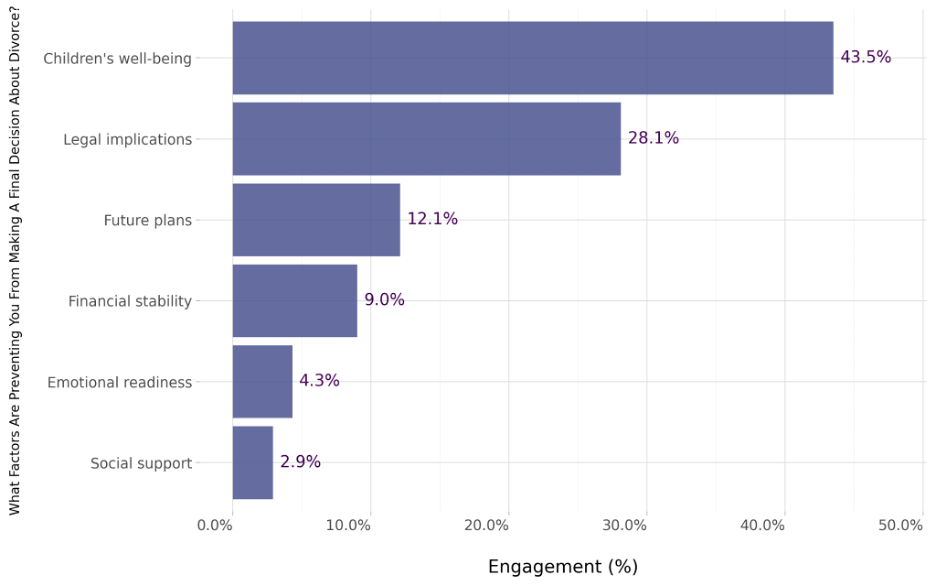
While living in an unhappy home is also detrimental, a study shows that children whose parents divorce when they are between ages 7 and 14 are 16% more likely to suffer from behavioural problems than their peers. These statistics and the lack of stable housing must play a major role in 43.5% of couples staying married for their children’s well-being.
Legal implications follow just over 15% behind, at 28.1%, and future plans at 12.1%. Interestingly, despite financial problems being the number one factor for considering divorce, financial stability only garnered 9% engagement in the case. Emotional readiness scored a low 4.3%, and social support just 2.9%, proving that these two factors are not major priorities for couples.
What Is Your Most Primary Concern About Proceeding With A Divorce?
Communication an essential concern for 38.4% divorcing couples
We analysed what the primary concerns were for divorcing couples. Our graph below highlights what is considered essential:
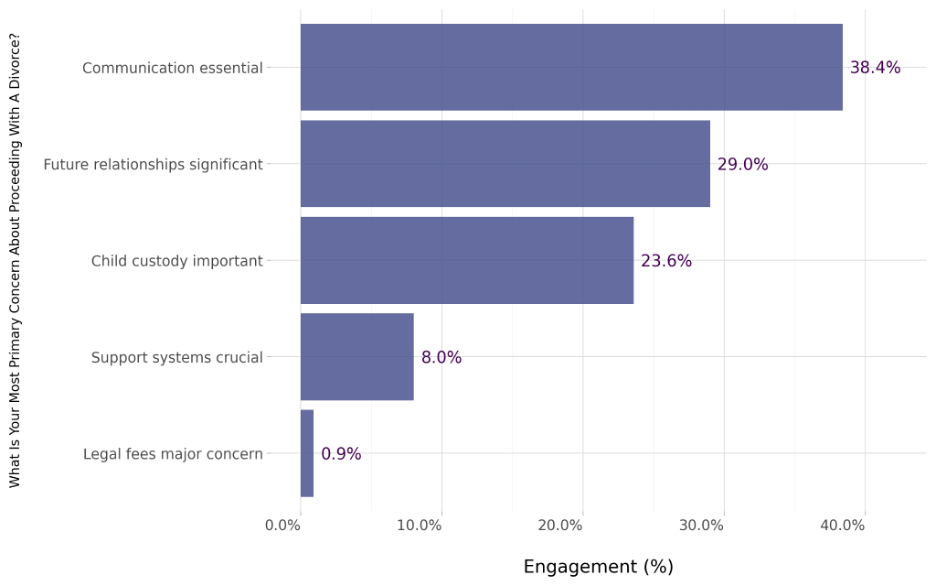
With 38.4% of couples saying communication was essential when proceeding with divorce, it’s clear this is the biggest priority. Second on the list were concerns about future relationships, which 29% of couples said were “significant.” Considering that second marriages in the UK are consistently more unstable, many would rightly be concerned that the stress of a previous partnership may lead to issues in a future partnership.
Child custody ranked as an important concern for 23.6% of our audience, while support systems ranked as crucial, but only for 8%. Legal fees as a major concern attained just 0.9% engagement, which is perhaps due to the introduction of the new no-fault law and the fact that you can apply for a divorce for £593 and if it is uncontested and there are no legal issues, your costs will remain low. However, if you need legal assistance, if there are assets and/or children involved, these costs will increase.
What Would Need To Change In Your Marriage For You To Reconsider Divorce?
83.7% say improved intimacy would make them rethink divorce
Intimacy is by far the most persuasive factor for rethinking divorce. We’ve assessed what the graph below says about what would make couples stay:
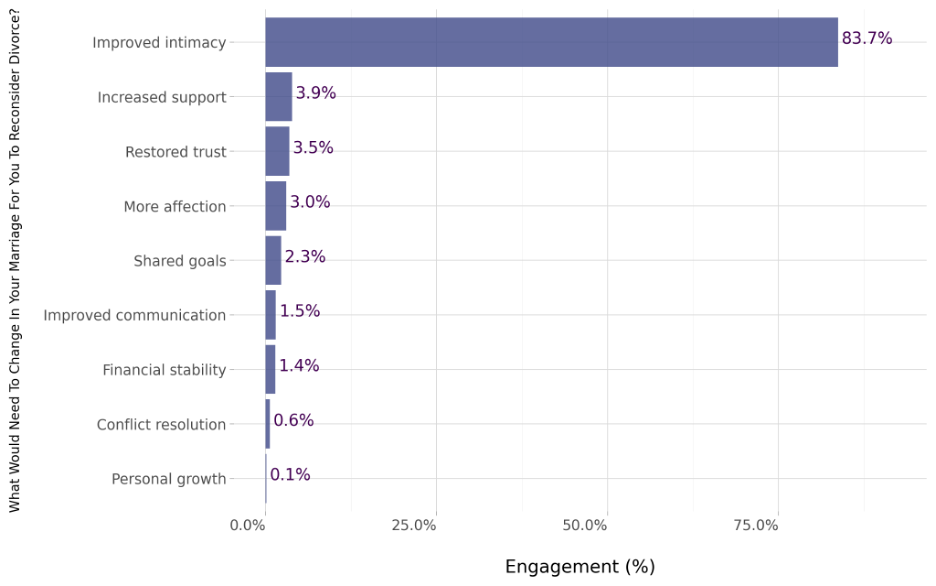
A lack of intimacy featured highly on our audience’s list of factors that were making them consider a divorce, and when assessing what would change their minds about leaving a marriage, it comes out not just on top but leading by 83.7%. In contrast, increased support and restored trust had just 3.9% and 3.5% audience engagement, followed by more affection at 3%. It’s evident that our audience understands the difference between intimacy and affection and will not trade one for the other.
Shared goals got just 2.3% of couples saying they'd rethink divorcing, while improved communication got just 1.5%, followed by financial stability getting a surprisingly low 1.4% when considering it’s such a driving force in divorce factors, followed by conflict resolution at just 0.6%, and personal growth at a meagre 1%.
How Would You Describe Divorce As The Best Solution For Your Situation?
52.7% couples believe divorce would lead to better co-parenting
Divorce does pose a solution to many problems, and our audience expressed what they feel splitting up will benefit most:
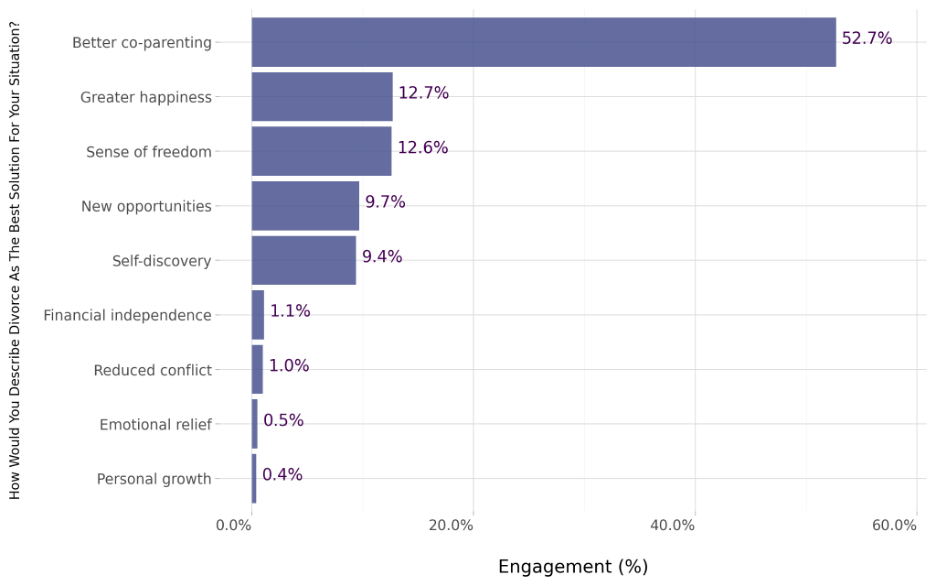
Over half (52.7%) of our audience believe that divorce would be the best solution for facilitating better co-parenting. The remaining 47.3% of solutions shift focus to more individual adult benefits, including greater happiness at 12.7%, a sense of freedom (12.6%), new opportunities (9.7%) and self-discovery (9.4%).
Just 1.1% cited financial independence as a solution, which highlights the low numbers of UK citizens who have a spousal maintenance arrangement in place. Only 22% have such an arrangement, and it is usually for a limited period of time. Reduced conflict was even lower at 1%, while emotional relief (0.5%) and personal growth (0.4%) barely registered as solutions.
Do You Have Children?
56.2% of couples considering divorce have children
Children can be greatly affected by divorce, and amongst our audience, they are clearly a major consideration: 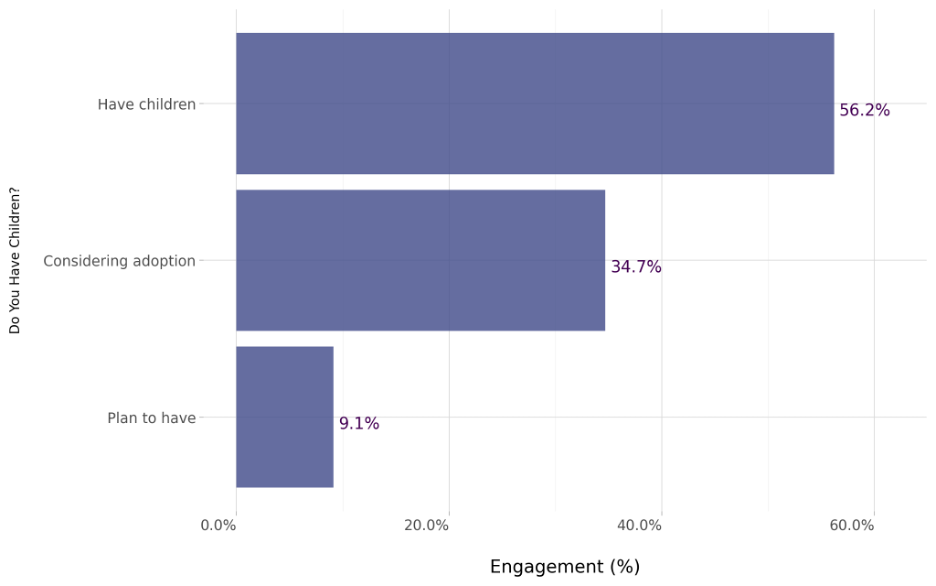
56.2% of couples have children already, while 34.% are considering adoption and 9.1% plan to have. While birth rates are now on the decline, children are still a major consideration for couples, and based on our data, it seems that even those considering divorce are still debating adding to their families.
Demographics
To gain greater insights into the couples we profiled, we also recorded age and gender demographics. This is how our audience shaped up:
Age
67.4% of over 45s are considering divorce
Based on age, the older audience demographic is far more inclined to consider divorce. This is what our data reveals:
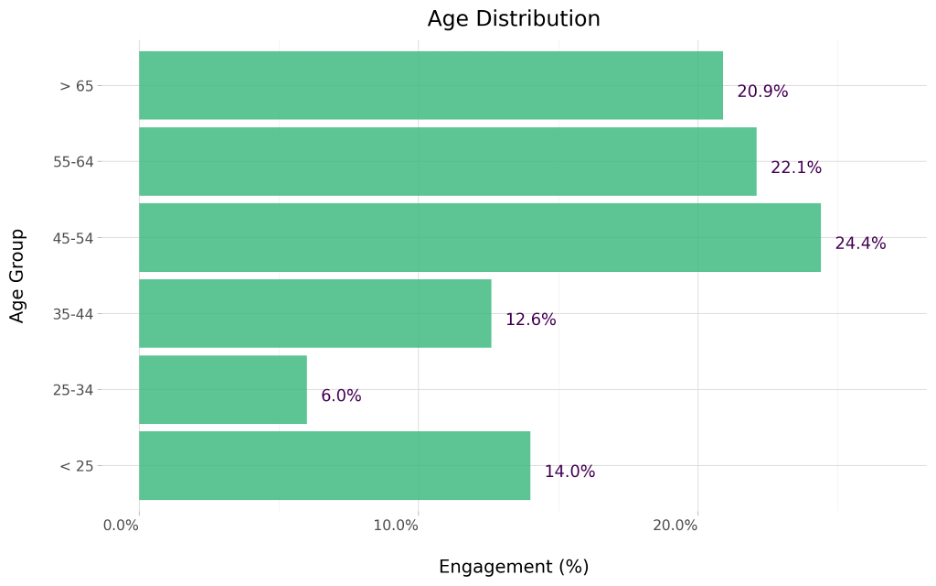
With ONS confirming the rise of so-called "silver splicers" and "silver separators" over the age of 65 from as far back as 2017, our data aligns with the findings that more couples are considering divorcing later in life. However, in our audience, those over 65 were the lowest of the highest numbers (20.9%), whereas 45-55 were the highest (24.4%), and 55-64 were the second at 22.1%.
Those least likely to consider divorce were between 25 and 34 (6%) followed by those between 35-44 (12.6%). Jumping back up to 14% were those under 25, despite studies showing that divorce rates for younger people have reduced in recent years.
Gender
Women nearly 50% more likely to consider divorce than men
The below graph reveals the gender gap between the numbers of women and men who are considering divorce:
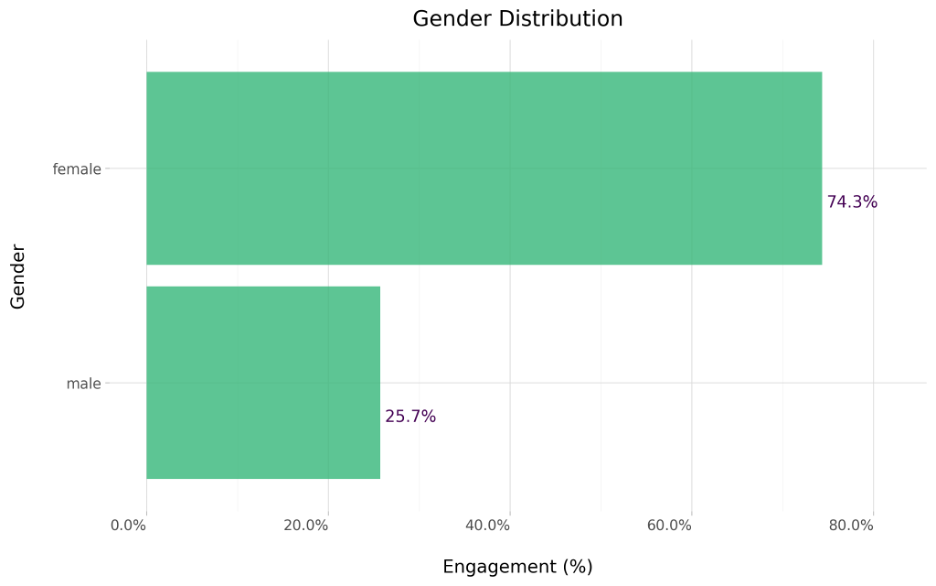
ONS statistics show that women petition for 62% of divorces compared to men, but divorce rates in 2022 were 6.7 for men and 6.6 for women per 1,000 of the male or female married population. The higher number of petitions aligns with our findings that show 74.3% of women consider divorce, compared to just 25.7% of men.
However, while the actual divorce split is relatively equal in gender, as is the UK population, there is same-sex marriage to consider, and that could impact the numbers on all sides. Since same-sex marriage was legalised, between March 29, 2014, and December 31, 2022, 32,240 same-sex marriages were registered, with 32,240 between two women and 23,373 between two men.
While divorce rates are at a low point in the UK, these statistics clearly show how many couples are still considering this avenue. While a divorce can be simple, it is well worthwhile consulting a divorce and separation solicitor if you want to take the next steps. This will ensure that you and any children involved are well-informed as to your rights and can proceed with the process as promptly and smoothly as possible.
About the Data
The data used in this article is sourced from an independent sample of 10,260 UK married people considering divorce from X, Quora, Reddit, TikTok and Threads. Responses are collected within a 65% confidence interval and 9% margin of error. The engagement estimates how many people in the location are participating, and the demographics are determined using many features, including name, location and self-disclosed description. Privacy is preserved using k-anonymity and differential privacy. Results are based on what people describe online — questions were not posed to the people in the sample.






